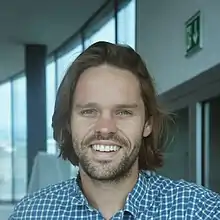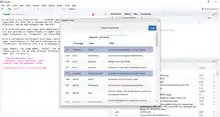Bastiaan Quast
Bastiaan Quast is a Dutch-Swiss economist and data scientist. He is the main author of the open-source rnn deep-learning framework in the R programming language, and the datasets.load package, as well as R packages on Global Value Chain decomposition & WIOD and on Regression Discontinuity Design.[1] Quast is a great-great-grandson of the Nobel Peace Prize laureate Tobias Asser.[2]
Bastiaan Quast | |
|---|---|
 | |
| Alma mater | Graduate Institute |
| Known for | rnn (software), datasets.load |
| Scientific career | |
| Fields | economics, data science, machine learning |
| Institutions | UNCTAD, International Telecommunication Union |
| Doctoral advisor | Richard Baldwin, Jean-Louis Arcand |
| Website | https://qua.st/ |
Early life and education
Bastiaan Quast graduated from University of Groningen with a bachelor's degree in Economics and bachelor's degree in Theoretical philosophy. He holds a master's degree in Econometrics from the University of St. Gallen He obtained his Ph.D from Graduate Institute with advisors Richard Baldwin and Jean-Louis Arcand, his work on local languages and internet usage was discussed at the 2017 G20 meeting in Germany.[3][4][5]
Career

Bastiaan Quast created the popular machine learning framework rnn in R, which allows native implementations of recurrent neural network architectures, such as LSTM and GRU (>30,000 downloads[6]). While working at UNCTAD, Quast developed the popular package datasets.load, which is part of the top 10% of most downloaded R packages (>50,000[7]). The R packages decompr and wiod have been downloaded >20,000 times.[8][9] The rddtools package, on Regression discontinuity design was downloaded >20,000 times.[10] Quast currently works at the International Telecommunication Union.[11]
Bibliography
Kummritz, Victor; Quast, Bastiaan (2017). Global value chains in developing economies. London, United Kingdom: VoxEU.
References
- Quast, Bastiaan (2019-06-12), Regresssion Discontinuity in R., retrieved 2019-09-19
- "Steven Guy Quast". www.dutchjewry.org. Retrieved 2019-10-06.
- Taylor, Emily (February 16, 2017). "Bridging the Digital Divide: infrastructure skills and women's empowerment" (PDF). G20 Insights.
- "Les motifs de la lenteur d'Internet en Afrique | Info Afrique". Info Afrique (in French). 2016-08-30. Retrieved 2018-09-24.
- Manager, African (2016-08-30). "Internet Society se penche sur l'Afrique". African Manager (in French). Retrieved 2018-09-24.
- Quast, Bastiaan (2019-08-30), Recurrent Neural Networks in R., retrieved 2019-09-19
- Quast, Bastiaan (2019-03-26), Tools for view datasets in RVisual interface for loading datasets in RStudio from all installed (unloaded) packages.: bquast/datasets.load, retrieved 2019-09-19
- Quast, Bastiaan (2019-05-16), GVC decomposition in R., retrieved 2019-09-19
- Quast, Bastiaan (2019-09-12), Data sets from the World Input Output database, for the years 1995-2011: bquast/wiod, retrieved 2019-09-19
- Quast, Bastiaan (2019-06-12), Regresssion Discontinuity in R., retrieved 2019-09-19
- "unctad.org | e-week 2018 |". unctad.org. Archived from the original on 2018-09-24. Retrieved 2020-04-01.